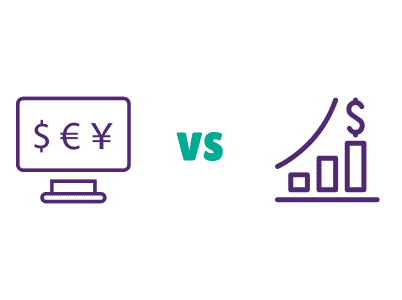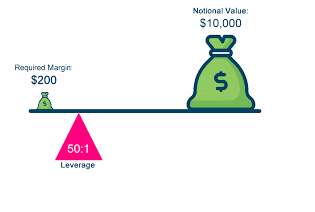Forex Trading vs. Stock Trading: Which is Right for You?
When it comes to investing, there are numerous avenues to explore, with forex trading and stock trading being two of the most popular options. Both offer unique opportunities and challenges, making the choice between them a crucial decision for any investor. To help you make an informed decision, we will compare forex trading and stock trading in terms of market structure, liquidity, leverage, trading hours, profit potential, risks, and how they align with your personal trading goals. Additionally, we'll discuss strategies for diversifying your investment portfolio.

Table Content
I. Comparison between Forex and Stock Markets
II. Differences in Market Structure and Liquidity
III. Leverage and Margin in Forex vs. Stocks
IV. Trading Hours and Global Market Accessibility
V. Profit Potential and Risks in Both Markets
VI. Choosing Based on Personal Trading Goals
a) Forex Trading is Suitable If
b) Stock Trading is Suitable If
VII. Tips for Diversifying Your Investment Portfolio
1. Asset Allocation
2. Geographic Diversification
3. Industry and Sector Diversification
4. Risk Tolerance Assessment
5. Professional Guidance
VIII. Footnote
Comparison between Forex and Stock Markets
The forex (foreign exchange) market and the stock market are distinct in terms of what they trade and how they operate:

a) Forex Market: The forex market deals with the trading of currencies from different countries. It is the largest and most liquid financial market globally, with a daily trading volume exceeding $6 trillion. Forex trading primarily occurs over-the-counter (OTC), meaning it takes place electronically between banks, financial institutions, and individual traders.
b) Stock Market: In contrast, the stock market involves the buying and selling of shares in publicly traded companies. Stock exchanges, such as the New York Stock Exchange (NYSE) and NASDAQ, serve as platforms for trading stocks. The stock market is decentralized, with various exchanges operating worldwide.
Differences in Market Structure and Liquidity
One of the key differences between forex and stock trading lies in their market structure and liquidity:
a) Forex Market: Forex offers unparalleled liquidity due to its massive trading volume and continuous 24-hour operation. This liquidity ensures that traders can enter and exit positions with minimal slippage, making it attractive for short-term and high-frequency trading strategies.
b) Stock Market: While stock markets also offer liquidity, they are subject to market hours and may experience gaps in trading when exchanges are closed. This can lead to higher volatility at the market open or close. Additionally, liquidity can vary significantly among individual stocks, with large-cap stocks generally being more liquid than small-cap or penny stocks.
Leverage and Margin in Forex vs. Stocks
Leverage and margin are essential concepts in trading, but they are applied differently in forex and stock markets:

a) Forex Market: Forex trading typically offers higher leverage, allowing traders to control larger positions with a relatively small amount of capital. While this can amplify profits, it also increases the potential for significant losses. Leverage ratios of 50:1, 100:1, or even 500:1 are not uncommon in the forex market, depending on the broker and regulatory environment.
b) Stock Market: Stock trading typically involves lower leverage, with margin requirements set by the brokerage and regulated by authorities. Leverage ratios for stocks are usually lower, often limited to 2:1 or 3:1, depending on the type of account and securities traded. This conservative approach can reduce the risk of catastrophic losses but also limits the profit potential.
Trading Hours and Global Market Accessibility
Trading hours can greatly impact your trading strategy and lifestyle. Here's how forex and stock markets differ in this regard:

a) Forex Market: Forex operates 24 hours a day, five days a week, thanks to its global nature and the overlapping trading sessions of major financial centers like London, New York, and Tokyo. This accessibility allows traders to choose trading hours that align with their schedules, making it suitable for those who prefer flexibility.
b) Stock Market: Stock markets have specific trading hours determined by the exchange where the stocks are listed. For example, the NYSE typically opens at 9:30 AM and closes at 4:00 PM Eastern Time. While after-hours trading exists, it is limited and carries additional risks. This structure may not be convenient for traders in different time zones or those with busy day jobs.
Profit Potential and Risks in Both Markets
Each market presents unique profit potential and risks:
a) Forex Market: Forex offers the potential for rapid and substantial gains due to high leverage, liquidity, and the ability to profit from both rising and falling markets. However, this potential comes with equally high risks, as leverage can lead to significant losses if not managed correctly. Currency markets can also be influenced by geopolitical events and economic data releases, adding to their volatility.
b) Stock Market: Stocks provide opportunities for long-term growth, dividend income, and capital appreciation. Investing in established companies with a solid track record can be a relatively stable way to build wealth over time. However, stock prices can be influenced by various factors, including company performance, economic conditions, and market sentiment. While the potential for catastrophic losses is lower compared to forex, stock investments are not risk-free.
Choosing Based on Personal Trading Goals
Selecting between forex and stock trading should align with your personal financial goals, risk tolerance, and trading style:
a) Forex Trading is Suitable If:
- You prefer short-term trading and can closely monitor the markets.
- You are comfortable with higher volatility and risk.
- You want the flexibility of 24-hour trading.
- You are interested in currency pairs and global economic events.
b) Stock Trading is Suitable If:
- You have a longer-term investment horizon and are interested in building wealth over time.
- You prefer lower leverage and less risk exposure.
- You are comfortable with traditional trading hours.
- You want to invest in individual companies or industries you believe in.
Tips for Diversifying Your Investment Portfolio
Regardless of whether you choose forex or stock trading, diversifying your investment portfolio is essential for risk management. Here are some tips:
1. Asset Allocation: Diversify across asset classes, including stocks, bonds, real estate, and alternative investments. This can help spread risk and reduce the impact of a downturn in any one market.
2. Geographic Diversification: Invest in assets from different regions and countries. This can protect your portfolio from adverse events that affect a specific geographic area.
3. Industry and Sector Diversification: Within the stock market, diversify your holdings across various industries and sectors to reduce exposure to sector-specific risks.
4. Risk Tolerance Assessment: Regularly assess your risk tolerance and adjust your portfolio accordingly. If you have a higher risk tolerance, you may allocate a larger portion of your portfolio to riskier assets like forex.
5. Professional Guidance: Consider seeking advice from financial advisors or professionals who can help you create a diversified investment strategy tailored to your goals and risk tolerance.
Footnote
In summary, the choice between forex and stock trading depends on your individual preferences, financial goals, and risk tolerance. Both markets offer unique opportunities and challenges, and it's crucial to understand the differences and align your choice with your trading style. Additionally, diversifying your portfolio across various asset classes and regions can help mitigate risk and enhance your overall investment strategy. Remember that successful trading and investing require education, discipline, and a well-thought-out plan, regardless of the market you choose to participate in.











Discussion